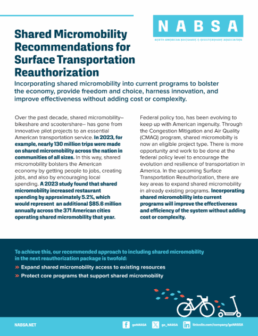NABSA Takes Shared Micromobility Advocacy to Washington as Surface Transportation Talks Begin
As Congress begins work on the next federal surface transportation reauthorization, the North American Bikeshare & Scootershare Association (NABSA) is working to ensure that shared micromobility is part of the conversation. Last month, a NABSA delegation, including Executive Director Sam Herr, Board President Waffiyyah Murray, and Advocacy and Government Affairs Director Shannon MacLeod, joined member organizations in Washington, DC to meet with lawmakers and staff to advocate for federal policies that protect and expand access to shared micromobility systems like bikeshare and scootershare.
The NABSA member delegation included Bicycle Transit Systems, Bike Share Pittsburgh, Bird, Lyft Urban Solutions, Pedal Movement, and ROAM Share. Together, they met with over 25 policy makers across the ideological spectrum, in both the Senate and the House. They made the case that shared micromobility is not only a proven transportation solution but an economic engine, helping people get to jobs, boosting local business revenue, and offering communities a sustainable, low-cost option.

NABSA is advocating for a two-pronged approach in the upcoming federal surface transportation reauthorization: first, to expand access to existing federal funding streams, and second, to protect and strengthen the core programs that already support shared micromobility. These efforts aim to ensure that bikeshare and scootershare systems are not only recognized as vital parts of the transportation network, but also able to grow and operate sustainably with consistent federal support.
To achieve this, NABSA is recommending several key policy updates. These include:
- Codify shared micromobility as an eligible project type in federal programs where it is already used in practice, including BUILD (Better Utilizing Investments to Leverage Development) grants, Carbon Reduction Program, Surface Transportation Block Grant (STBG) program
- Designate shared micromobility as an “associated transit improvement” by amending Section 5302 of Title 49 in federal transit law.
- Expand eligibility for operational investment under the Congestion Mitigation and Air Quality (CMAQ) program.
These policy changes would increase access to federal funding, streamline program implementation, and enable shared micromobility systems to scale in response to growing demand.
These updates would not only recognize shared micromobility’s growing role in the transportation ecosystem but also improve government efficiency, increase mobility choices, and allow systems to scale in response to demand. By leveraging the flexibility of existing programs and aligning policy with practice, Congress can support a transportation future that is cleaner, less congested, more efficient and offers more options to communities of all sizes.
You can view NABSA’s full set of federal policy recommendations in our priorities one-pager. NABSA members are invited to a member-only policy event, Steering Through Shared Micromobility Policy: US and Canada on July 29th at 2pm ET to learn more about our US Hill Day and other legislative priorities across the US and Canada. Register here! *Members must be logged into their member center account to register. Interested in becoming a NABSA member? Contact us!

